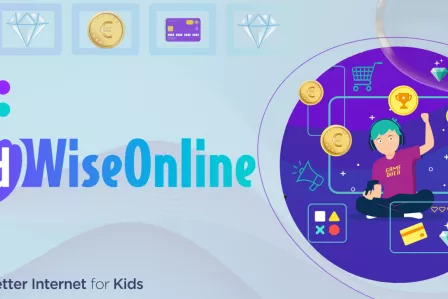On Safer Internet Day 2024, the AdWiseOnline campaign has been launched to raise children's and young people's awareness of digital marketing practices and empower them with knowledge about their economic rights. This initiative, informed by research, particularly focuses on practices such as influencer and in-game marketing. It is rolled out in cooperation with Safer Internet Centres and European Consumer Centres, and coordinated by the Better Internet for Kids project.

Children spend a significant amount of time using smartphones, also from an ever-younger age. This heightens concerns regarding child and youth consumer protection in the digital environment. Notably, influencer marketing and in-game (data-driven) marketing stand out among various digital marketing practices.
Influencer marketing involves influencers, some of who are minors or ‘kidfluencers’, subtly integrating advertising into their content without clearly indicating it. These influencers typically foster a connection with young people on platforms like TikTok and Instagram. Research indicates that children are more influenced by commercial messages within influencer videos.
In-game marketing uses various strategies, including ad pop-ups and advergames, which can subtly guide players to spend more time and money online. The complex nature of microtransactions, loot boxes, and sponsorships by gaming live streamers and similar, also makes it challenging for children to fully recognise and track their spending.
Additionally, the increasing trend of leveraging emotions for marketing, incorporating neuromarketing research and emotional analytics, further intensifies the effectiveness of these practices. It underscores the need for awareness and attention to the tactics used by marketers, especially in the face of advancing artificial intelligence.
The AdWiseOnline campaign kicks off with the publication of a research report on manipulative digital marketing practices targeted at children and youth online, produced by Ghent University. Following this, a range of educational and awareness-raising materials will be launched to highlight some of the key business models and mechanisms that children and young people face as consumers. These include understanding that:
- influencers’ recommendations for a product or a service are most likely ‘hidden’ advertising;
- games increasingly rely financially on in-game purchases where, for example, children are prompted to buy 'coins' or similar to progress;
- in digital marketing, targeting and profiling mechanisms are used as well as various techniques to leverage emotions;
- children and young people have rights as consumers;
- companies and content creators have responsibilities.
Visit the AdWiseOnline campaign page, and follow the #AdWiseOnline hashtag to get updates on the campaign through social media.
Background
Better Internet for Kids is a European Union-funded initiative. Guided by the Better Internet for Kids (BIK+) strategy (adopted in May 2022) it aims to ensure that children are protected, respected and empowered online in the Digital Decade, in line with the European Digital Principles.
On Safer Internet Day 2024, the AdWiseOnline campaign has been launched to raise children's and young people's awareness of digital marketing practices and empower them with knowledge about their economic rights. This initiative, informed by research, particularly focuses on practices such as influencer and in-game marketing. It is rolled out in cooperation with Safer Internet Centres and European Consumer Centres, and coordinated by the Better Internet for Kids project.

Children spend a significant amount of time using smartphones, also from an ever-younger age. This heightens concerns regarding child and youth consumer protection in the digital environment. Notably, influencer marketing and in-game (data-driven) marketing stand out among various digital marketing practices.
Influencer marketing involves influencers, some of who are minors or ‘kidfluencers’, subtly integrating advertising into their content without clearly indicating it. These influencers typically foster a connection with young people on platforms like TikTok and Instagram. Research indicates that children are more influenced by commercial messages within influencer videos.
In-game marketing uses various strategies, including ad pop-ups and advergames, which can subtly guide players to spend more time and money online. The complex nature of microtransactions, loot boxes, and sponsorships by gaming live streamers and similar, also makes it challenging for children to fully recognise and track their spending.
Additionally, the increasing trend of leveraging emotions for marketing, incorporating neuromarketing research and emotional analytics, further intensifies the effectiveness of these practices. It underscores the need for awareness and attention to the tactics used by marketers, especially in the face of advancing artificial intelligence.
The AdWiseOnline campaign kicks off with the publication of a research report on manipulative digital marketing practices targeted at children and youth online, produced by Ghent University. Following this, a range of educational and awareness-raising materials will be launched to highlight some of the key business models and mechanisms that children and young people face as consumers. These include understanding that:
- influencers’ recommendations for a product or a service are most likely ‘hidden’ advertising;
- games increasingly rely financially on in-game purchases where, for example, children are prompted to buy 'coins' or similar to progress;
- in digital marketing, targeting and profiling mechanisms are used as well as various techniques to leverage emotions;
- children and young people have rights as consumers;
- companies and content creators have responsibilities.
Visit the AdWiseOnline campaign page, and follow the #AdWiseOnline hashtag to get updates on the campaign through social media.
Background
Better Internet for Kids is a European Union-funded initiative. Guided by the Better Internet for Kids (BIK+) strategy (adopted in May 2022) it aims to ensure that children are protected, respected and empowered online in the Digital Decade, in line with the European Digital Principles.
- gaming campaign advertising
Related content
- < Previous article
- Next article >












